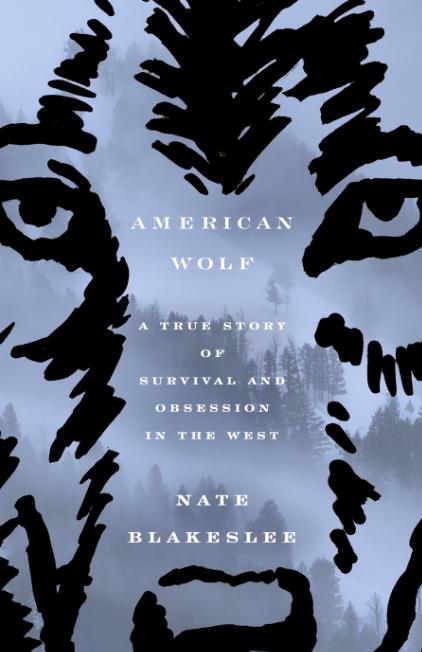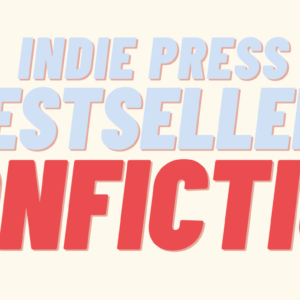
15 Books You Should Read This October
A Reading List for Shorter Days and Crisper Nights
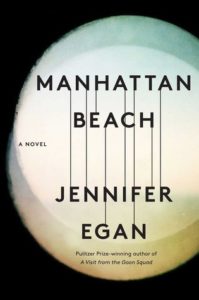
Jennifer Egan, Manhattan Beach
(Scribner)
It’s “only” taken seven years, but Jennifer Egan is finally back after her beloved and Pulitzer-winning A Visit from the Goon Squad—this time with a historical novel. Set during the Depression and the Second World War, Manhattan Beach follows, mainly, the coming of age of a young woman, Anna Kerrigan, who becomes a diver in the Brooklyn Naval Yard—repairing war ships underwater by day while making underworld connections, and investigating her father’s vanishing, by night. I am excited to think that, like its predecessor, it will articulate with magic lucidity those moments when disparate human lives intertwine.
–Marta Bausells, Lit Hub contributing editor
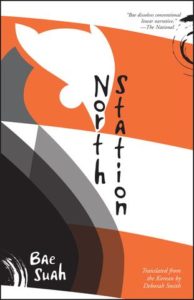
Bae Suah, North Station, tr. Deborah Smith
(Open Letter)
In the last few years, a number of books by the Korean writer Bae Suah have appeared in English translation, ranging from realistic accounts of everyday malaise to forays into the surreal and philosophical. North Station is the first collection of her short stories to be translated into English, and I’m eager to see what her aesthetic brings to the format.
–Tobias Carroll, Lit Hub contributor
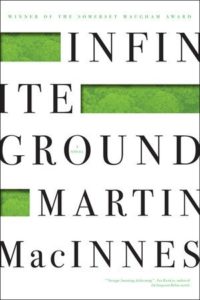
Martin MacInnes, Infinite Ground
(Melville House)
Infinite Ground beguiled me. It’s a tropical fever dream, a detective novel turned on its head, a wending into a new heart of darkness that brings to mind so many writers (Aira, Ballard, Angela Carter) but manages through sheer perverse originality to stand shoulder-to-shoulder with its influences.
–Stephen Sparks, Lit Hub contributing editor
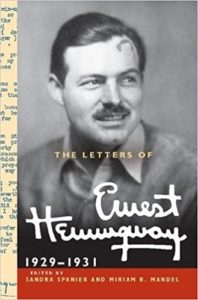
The Letters of Ernest Hemingway: Volume 4, 1929-1931, ed. Sandra Spanier
(Cambridge University Press)
I find that as a writer there is no better book to keep on one’s nightstand than a collection of letters or diaries from an author one admires. One needn’t read these documents from cover to cover, but merely dip in and out of them for inspiration and—perhaps more importantly—commiseration. Sometimes writing feels like a black hole, a darkness of the soul, and it helps to hear your forebears and betters wrestling with the same demons. “That terrible mood of depression of whether it’s good or not is what is know as The Artist’s Reward,” Hemingway writes in one of his missives to F. Scott Fitzgerald in this volume. This collection of letters from the period immediately following the release of A Farewell to Arms makes a great bedside companion.
–Tyler Malone, Lit Hub contributing editor
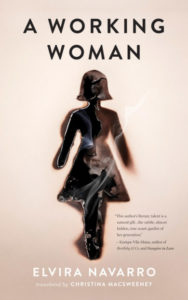
Elvira Navarro, A Working Woman, tr. Christina MacSweeney
(Two Lines Press)
Elvira Navarro’s A Working Woman, translated from Spanish into enchanting English by Christina MacSweeney, is a subtly experimental marvel. The novel follows Elisa, a poorly and rarely paid copy editor and novelist, as she develops a strange friendship with her new roommate, wanders the transforming streets of Madrid, and struggles to make life into art as anxiety encroaches. A novel of economic and psychological precarity and an exploration of the tension between the boundedness of art and the formlessness of life, A Working Woman is as charming as a fable and as frenzied as a fever dream.
–Nathan Goldman, Lit Hub contributor
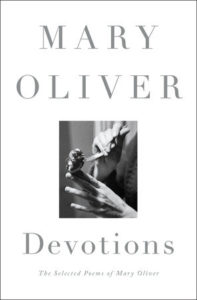
Mary Oliver, Devotions
(Penguin Press)
Have we ever needed poetry as much as we need it in 2017? The answer is yes—but now is a good time to be reminded of the beauty in the world, to balance all of the tragedies. Devotions: The Selected Poems of Mary Oliver offers the best of the Pulitzer Prize-winning poet’s work. Her writing is deceptively simple, as smooth as stones washed ashore on the beach. But Oliver magnifies the natural world in a way that inspires wonder.
–Michele Filgate, Lit Hub contributing editor
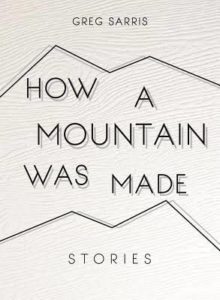
Greg Sarris, How a Mountain Was Made
(Heyday)
Novelist Greg Sarris, author of Grand Avenue, which became an HBO miniseries co-produced with Robert Redford, and Watermelon Nights, is tribal chair of the Federated Indians of Graton Rancheria. His new book, a collection of 16 interlinked stories drawn from Coast Miwok and Southern Pomo creation tales, is a fresh take on the tradition of Aesop and Calvino’s Italian Folktales. These fables are set on Sonoma Mountain and Cotati plain, and feature Coyote, headman of the big village near the headwaters of Copeland Creek, his twin granddaughters, Question Woman and Answer Woman (she’s the one who points out, “Stories are like invisible seeds”), Rattlesnake and Hummingbird, Deer, Mountain Lion, Skunk, a beautiful red dragonfly, a pretty woman and her abalone shell necklace and more. Lessons on good leadership and how all things are connected, crafted with clarity and grace.
–Jane Ciabattari, Lit Hub columnist
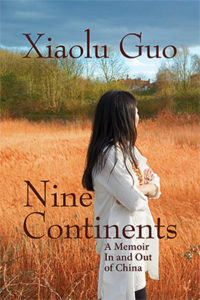
Xiaolu Guo, Nine Continents: A Memoir In and Out of China
(Grove Press)
In the 1970s and 80s, while I was dressing like Madonna and complaining about my 9:00 pm curfew, Xiaolu Guo was starving and eating boiled squash leaves for dinner. Brought up beneath the blackness of her grandfather’s abuse in a poor fishing village, Guo escaped the assaults of rural China with a fearless, practical, and unflagging will. And her memoir of that journey is written with an acute and urgent voice. I met Guo in Berlin last spring, and she suffers no fools. After I read her book, I thought of course, for what’s left for her to suffer? An excerpt from Nine Continents was published in Lit Hub in March.
–Kerri Arsenault, Lit Hub contributing editor
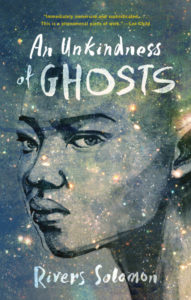
Rivers Solomon, An Unkindness of Ghosts
(Akashic Books)
The title of Rivers Solomon’s diverse debut novel, An Unkindness of Ghosts, is apt, suggesting the book’s haunted, cruel, and fascinating world. The novel imagines a dystopian setting in which much of humanity lives on a vast spaceship, the HSS Matilda, which ferries them to a mythic “Promised Land.” If the vehicle represents a technologically advanced future, the ship’s societal organization is the opposite, for it echoes the racial segregation of antebellum America. The Matilda is sharply divided by decks; only certain “types” of people are supposed to live on each. What sets apart Solomon’s vision of a segregated future is that gender non-conformity is also key: different decks use different pronouns. Not long before the point at which the book begins, we’re told the ship’s leaders had been contemplating a fascistic plan to use gender-non-conforming individuals as slaves even after death by reanimating their corpses with a controversial technology.
Here is a novel that puts non-binary and multiracial identities at the forefront of a violent future we may all too easily recognize today. Many sci-fi works, like Philip K. Dick’s Do Androids Dream of Electric Sheep or the bande-dessinée series Orbital, are premised on a mania for being able to identify the Other, be it androids or aliens. An Unkindness of Ghosts shows those of us who defy the gender binary as the unnerving Other, revealing how gender non-conformity can so utterly terrify the traditional that they feel the need to conceal us, exile us, brutalize and dehumanize us. Solomon’s fascinating and deeply realized novel joins the imaginative ranks of Octavia Butler and Nalo Hopkinson, each of whom carved out unique places in the largely white male world of sci-fi as black women writers. Solomon, who is non-binary, enters the world of sci-fi with their own revolutionary debut, which should appeal to avid and first-time sci-fi readers alike.
–Gabrielle Bellot, Lit Hub staff writer
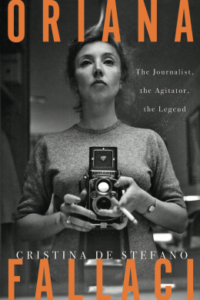
Cristina de Stefano, Oriana Fallaci: The Journalist, the Agitator, the Legend,
tr. Marina Harss
(Other Press)
I have always admired and been dazzled by Oriana Fallaci’s brilliance. Her intellectual rigor and her fierce drive for uncovering the truth made her an iconic journalist and writer. But who knew that so much depended on her red nail polish? This exceptional biography fleshed out gaps in my knowledge. The fact that Fallaci always wore red nail polish and black eyeliner absolutely fascinated me. Her nails were red whether in Florence, Manhattan, or embedded with American soldiers in Vietnam. I am confident this wasn’t vanity, but more: red nails as assertion of self, red nails as an uncompromising statement of personal and feminine authority, red nails as stability when so frequently she was in perilous situations, red nails as metaphor for slicing at the conscience of a despot. Her accomplishments were many and varied and always transcendent. This biography is a must read.
–Lucy Kogler, Lit Hub columnist
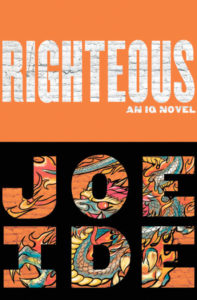
Joe Ide, Righteous
(Mulholland Books)
Last year at this time, Joe Ide came out with his debut novel, IQ, introducing one of the best loved detectives in the recent annals of crime fiction—Isaiah Quintabe (dubbed “IQ”), a 20-something in Long Beach, CA with a gift for deductive reasoning and a reputation as a man you can go to for help when the police aren’t an option. Righteous is Ide’s follow-up, with a new set of cases for IQ to solve and the trauma of his brother’s death still hanging over him. The action takes our man and his sidekick, Dodson (who provides the books with a bit of swagger, as well as some excellent soul food recipes) to Vegas, chasing after a woman in danger and running afoul of a slew of gangsters, loan sharks, and muscle-for-hire. IQ was a shot of adrenaline for Sherlock-style mystery lovers, and everyone’s hoping Ide can build on that success by developing IQ’s adventures into a full-fledged (book and TV) series.
–Dwyer Murphy, Lit Hub editor
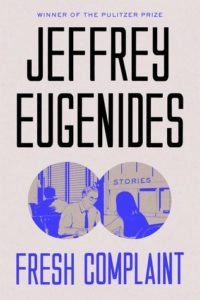
Jeffrey Eugenides, Fresh Complaint
(Farrar, Straus and Giroux)
Until now, when hipsters sniffed—I prefer early Eugenides—that would mean The Virgin Suicides, the Detroit author’s 1993 tone poem to suburban suicide. But with the publication of this debut collection they’ll have to be more specific. Some of the work Eugendies has assembled here dates back to 1989, when he was working at the American Academy of Poets and perhaps even a poet. These fictions have aged well, though. Spanning the late ’80s to the present, these are fresh and funny and often very weird stories. For a writer who has retooled his style for every book, Eugenides’ concerns are remarkably stable—the fragility of family and the combustion of wild dreams. The miracle of procreation and the lengths to which people will go to make it happen. Of the collection, “Air Mail,” with its riffs on transcendence and hilarious send-up of a young man’s vision quest, is the star. Elastic in tone but taut in its language, it shows too that Eugenides was always an old-fashioned story-teller at heart—Euginedes just took his time showing us that.
–John Freeman, Lit Hub executive editor
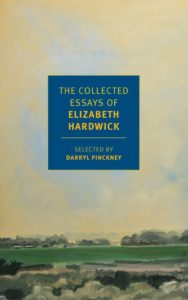
The Collected Essays of Elizabeth Hardwick, selected by Darryl Pinckney
(NYRB Classics)
Having greedily drunk down Sleepless Nights for the first time this summer—it begins, appropriately, “It is June. This is what I have decided to do with my life just now”—I am eager for more Hardwick, and NYRB Classics’ Collected Essays has arrived just in time. Selected and introduced by Darryl Pinckney, this cross-section of Hardwick’s 50-year career renders questions of whether criticism can be art obsolete: Taking in her complicated, flyaway sentences (she “[stacked] adjectives like rings on light fingers,” as Sarah Nicole Prickett recently wrote), you know you couldn’t possibly be looking at anything else.
–Jess Bergman, Lit Hub features editor
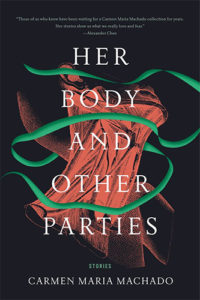
Carmen Maria Machado, Her Body and Other Parties
(Graywolf)
I’ve been recommending Carmen Maria Machado’s work to pretty much everyone I meet since I read her story “The Husband Stitch” in Granta in 2014. So it almost seems strange that Her Body and Other Parties is only her first collection—she feels established in a way most new short story authors are not. Accordingly, the stories in this book are of the finest quality: sexy and threatening, strange and playful—sometimes even goofy. She’s at her best, it seems to me, when writing about a) female-ness and b) story itself—two topics, luckily, that are vast and mutable and woven elegantly throughout this collection.
–Emily Temple, Lit Hub associate editor
Nate Blakeslee, American Wolf: A True Story of Survival and Obsession in the West
(Crown)
For nearly 75 years, Yellowstone National Park (and much—if not all—of America’s Great West) was free of wolves. But in the early 1990s, to redress what many were starting to realize was an ecological imbalance, a few Canadian wolf packs were introduced to the territory, and the coming years saw one of the world’s great predators flourish across its traditional habitat. But where wolves roam, to too does controversy: in this case, between wildlife biologists (and hobbyists), and ranchers. American Wolf follows the dual dramas of individual packs trying to survive valley to valley, and the ever-mounting tensions between scientists and locals, which leads to a political climate that values the short term over the long.
–Jonny Diamond, Lit Hub editor









